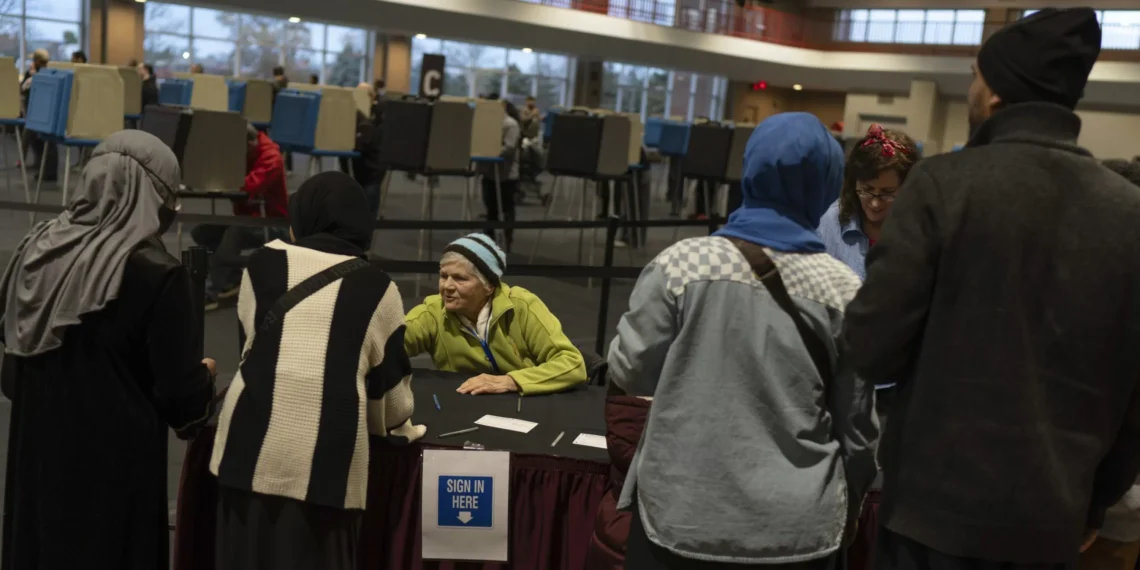As the US presidential election approaches, the nation is once again divided between two major candidates. However, amidst all the chaos and political polarization, a lesser-known group of voters is making their voices heard – Arab and Muslim voters in Michigan. In a state where their community makes up a significant portion of the population, their votes could prove to be crucial in determining the outcome of the election. In conversations with two dozen of these voters, it became evident that their decision to vote for Trump or a third-party candidate was driven by a multitude of factors, including their religious beliefs, concerns about foreign policy, and the ongoing humanitarian crisis in their home countries.
Michigan, a battleground state with 16 electoral votes, has a significant Arab and Muslim population, particularly in the city of Dearborn. According to a report by the Arab American Institute, there are over 300,000 Arab Americans living in Michigan, making up 3% of the state’s population. In addition, there are also a considerable number of Muslim voters, who have been facing increased scrutiny and discrimination in recent years. With their collective voice, these voters have the power to sway the election in a crucial swing state.
In conversations with Arab and Muslim voters in Michigan, it was clear that their voting decisions were not based on party loyalty or traditional political ideologies. Many expressed their discontent with both major candidates and their parties, citing issues such as corruption, lack of representation, and broken promises. As a result, they are turning to alternative options, including third-party candidates.
One of the key factors driving their decision to vote outside of the two-party system is the ongoing humanitarian crisis in their home countries. As citizens of Middle Eastern and North African countries, they have witnessed firsthand the devastating effects of war and conflict. For many, the issue of foreign policy and the candidates’ stance on intervention in the region is a critical factor in their voting decision.
Some voters expressed their support for Trump, citing his non-interventionist approach and his promises to end endless wars. One voter, a Syrian immigrant, stated, “As someone who has seen the atrocities of war, I appreciate Trump’s stance on not getting involved in conflicts that do not directly concern us. I believe he is the best candidate to bring stability to the region.”
On the other hand, some voters expressed their concerns about Trump’s rhetoric and policies towards Muslims and immigrants. However, for some, the issue of foreign policy outweighs these concerns. As another voter, a Yemeni American, stated, “While I may not agree with Trump’s rhetoric, I believe his policies in the Middle East will ultimately benefit my home country. I can’t overlook genocide in the name of political correctness.”
For many Arab and Muslim voters, the decision to vote for a third-party candidate is a way to voice their discontent with the current political system. They see it as a way to break away from the traditional two-party divide and support candidates who align more with their values and beliefs. Some voters expressed their support for the Green Party candidate, Dr. Jill Stein, who has been vocal about ending US involvement in wars and advocating for social justice and equality.
One voter, a Palestinian American, explained, “I refuse to participate in a system that does not represent me. I will be voting for Jill Stein because she stands for what I believe in – peace, justice, and equality for all.”
The decision to vote for a third-party candidate is not without its challenges. In a system that heavily favors the two major parties, many voters worry that their vote will not make a significant impact. However, for these voters, it is not just about the outcome of the election but also about sending a message to the political establishment.
As the election draws closer, it is clear that Arab and Muslim voters in Michigan are not a monolithic group, and their votes cannot be taken for granted. They are a diverse community with varying beliefs and concerns, and their votes will ultimately be based on what they believe is best for their community and their home countries.
In a country where minority voices are often silenced, it is crucial to listen to the perspectives of Arab and Muslim voters in Michigan. Their votes may hold the key to a more inclusive and representative political system. As one voter eloquently put it, “As an Arab American, my vote is a way for me to make my voice heard and make a difference. I am proud to exercise my right to vote and be a part of shaping the future of






